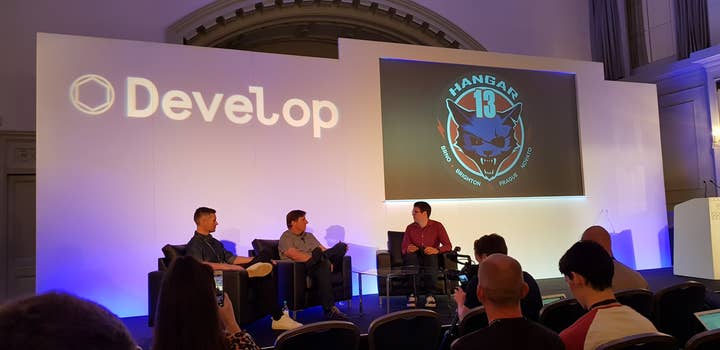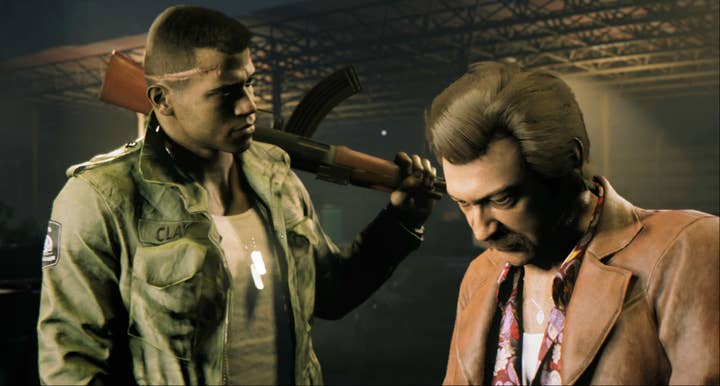Hangar 13: Diversifying your team protects you from blind spots
The Mafia III developer on “walking a tightrope” with the game's narrative and how the risks it took shaped the new Brighton studio
The importance of team diversity is regularly underlined in today's industry, but a notable example examined this week was that of Hangar 13, the studio behind open-world action title Mafia III.
The developer discussed how it has ensured it hires and retains a broad range of talent during a keynote speech at Develop:Brighton, hosted by GamesIndustry.biz.
Part of this diversity can be attributed to the way the studio grew. Originally comprised of ex-LucasArts developer Haden Blackman and one other producer, it received an influx of people from the Czech Republic, including 30 or 40 from parent 2K Games' local studio, which had previously led development on the Mafia games.
Hangar 13 also brought in people from within other 2K studios, including several members of the team behind XCOM spin-off FPS The Bureau, and when LucasArts eventually closed, the company was able to pick up many of the developers affected.
"Believe it or not, San Francisco is not the most diverse city on Earth. It's got nothing on Brighton, nothing on London. So when it came to opening a studio here, there are not many better places from that perspective"
Andy Wilson, Hangar 13
"We had these four different cultures right away," global studio head Blackman said on stage. "They all came to making games differently... While that could have been really damaging and detrimental to development, the way that we approached it meant we had cross-team pods, we could mix all these people together and it ended up becoming one of the strengths of the studio because we had so many different backgrounds and collectively hundreds and hundreds of shipped titles. We were able to cherry pick the best practices."
Vice president of development Andy Wilson added: "When you have so many different perspectives, it generates a lot of great conversations around different ways of doing things. There's no right way or wrong way of doing things, but if you just take a homogeneous group of people that have only ever worked together, you're never going to have that cultural diversity [you need]."
Another factor that has helped Hangar 13 recruit a wider range of people is the "culture of no blame" that the management has developed, ensuring that everyone feels able to raise an issue - especially one they may have inadvertently caused themselves.
"The message we gave everybody across the team was it's okay to make mistakes, it's okay to admit that you did something wrong or missed something, but you have to be open and honest about it," said Blackman. "The culture completely changed: we tried to have a culture that's not about blame, it's more about problem solving.
"Once everyone got on board with that, they were like, 'oh, okay, I don't have to solve this myself or present this in the best light, I can be honest as I need in order to solve the problem', and a lot of the friction went away."
Wilson added: "It is important because the fear of being punished for something, for raising a problem means you're going to sit on that problem and then the whole ship starts to stink."

Hangar 13 is currently spread across four locations, encompassing the original Novato, California studio, as well as two Czech branches in Prague and Brno, plus the newly-opened Brighton studio. Advances in communication technology means all four are able to collaborate efficiently, to the point where the firm still likes to refer to itself a single studio.
Anyone who attended Develop:Brighton this week will not have failed to notice the UK branch is currently on a recruitment spree, and the firm is keen to bring in as broad a range of skills and perspectives as possible - in part to build on the learnings and successes seen with Hangar 13's most recent title, 2016's Mafia III.
The game is an open-world action title in much the same vein as the outing before it, but an important point of difference was the choice of an African-American protagonist and realistic depictions of the abundant racism inherent to the 1960s settings. It was a risk, especially for an AAA game, but one that was applauded by critics. And Hangar 13 says the diversity of the team was instrumental in achieving this.
"With Mafia III, it became gruesomely apparent that we were walking a tightrope with the narrative - it could have gone disastrously wrong in a number of different ways"
Andy Wilson, Hangar 13
"With Mafia III, it became gruesomely apparent that we were walking a tightrope with the narrative - it could have gone disastrously wrong in a number of different ways," says Wilson. "But we had representation in terms of writing, it wasn't an all-white writing team, and that was really important - not just because you don't want just white people writing about a black protagonist in the '60s, but also because we found that in that particular case we got pushed further as well. Someone would say, 'ooh, well, this a little on the nose' but other people on the team would say, 'no, we should actually push it harder', which is something we may not have done otherwise.
"It was also important because where we are, it's not easy to hire a diverse team - believe it or not, San Francisco is not the most diverse city on Earth. It's got nothing on Brighton, nothing on London. So when it came to opening a studio here, there are not many better places from that perspective. All those different perspectives, whether it gay, straight or bi, whether it's male or female, it's important because it gives you balance and stops you from developing these weird blind spots where you don't realise you're going down a bad alley unintentionally when you're doing something with the narrative.
"Again, back into being able to [raise problems] without fear of reprimand, those two things combined can be quite powerful."
In fact, Blackman says the studio's willingness to tackle such a tough subject has since further improved its ability to hire a diverse range of new recruits.
In the often risk-averse AAA industry, it wouldn't be surprising if there had been pushback from 2K Games against Hangar 13's chosen topic but Blackman reports there was none - and even he had been expecting it.
"We always want to be taking some sort of risk, and challenging ourselves creatively, because that's how you do the most exciting [work] and generate the best results at the end of the day," he said.
"We always want to be taking some sort of risk, and challenging ourselves creatively, because that's how you do the most exciting [work] and generate the best results at the end of the day"
Haden Blackman, Hangar 13
"It didn't take very long, maybe a couple of weeks, to narrow in on the setting and the time period, to decide who the most interesting character to follow would be. The great thing about games is, and the great challenge is, we have the opportunity to put you in the shoes of somebody you'd never be able to walk in.
"So we settled on this African-American protagonist who's a Vietnam vet - and really that was the pitch to 2K, that this was the most interesting character to tell a story about. We wanted to reclaim the term 'mafia', show that it's more than just the Italian-American mob. And they were like, 'that's great, that sounds super exciting, let's go do it'."
The studio boss added that he's pleased to see Mafia III has had "a really long tail in a heartening way", with Hangar 13 still called on to discuss it two years on.

The duo also discussed a controversial opening section that was originally developed for the game, but the lack of time to ensure it was handled as sensitively as it needed to be meant this prologue had to be cut.
"Which was super painful for me personally because it was something that I pushed forward and championed, and I ended up directing that day's mocap shoot because it was such sensitive subject matter, and we worked on it for a couple of months. But it was absolutely the right thing to do in hindsight," said Blackman.
"We should tell stories with meaningful characters who you would not usually encounter in any other way. It's important for a games to have a diverse cast"
Haden Blackman, Hangar 13
Wilson added that this whole cold open "has been burned from our servers."
"It literally does not exist because if ever that had come out without context in any form it would have looked terrible," he adds.
Two years on from Mafia III, the newly expanded Hangar 13 is now working on an original and unannounced IP. While Wilson stressed that "we own the Mafia franchise and we're not letting anyone take it", the developer is keen to try new things, with the VP adding Hangar 13 is not going to "rinse and repeat single-player open world games."
But the work on Mafia III has left a lasting impression on the whole team, especially Blackman, who is keen to seeing Hangar 13 build on its legacy in the next project.
"I am incredibly proud of Mafia III, on every level," he said. "The fact that we're tackled this really tough subject matter was fantastic and at the end of the day it's an important game. It's a violent exploration of damaged people. We want to continue to deal with character studies and dive into... this is going to sound really pretentious but, to dive into what makes people tick.
"But I think a lot of us on the team also want to do something a bit more aspirational and a bit more uplifting at the end of the day. The tone of this new game we're working on is a little bit different to Mafia III, but it has a lot of similarities in terms of strong characters. It's got weight and heft. And it's mature - not necessarily the rating but the subject matter."
When asked by a member of the audience whether this desire to make an uplifting game would take the studio too far away from the great work it had done with Mafia III, whether Blackman felt his team had a responsibility to continue creating politically-charged games, the studio head said: "I feel a sense of responsibility in the sense that I feel that we have the ability to tell meaningful stories."
He continued: "We should tell stories with meaningful characters who you would not usually encounter in any other way. It's important for a games to have a diverse cast. And just because I say the tone is a little bit more uplifting, we're still dealing with a really gritty subject matter and themes, and we're not afraid to tackle those."








